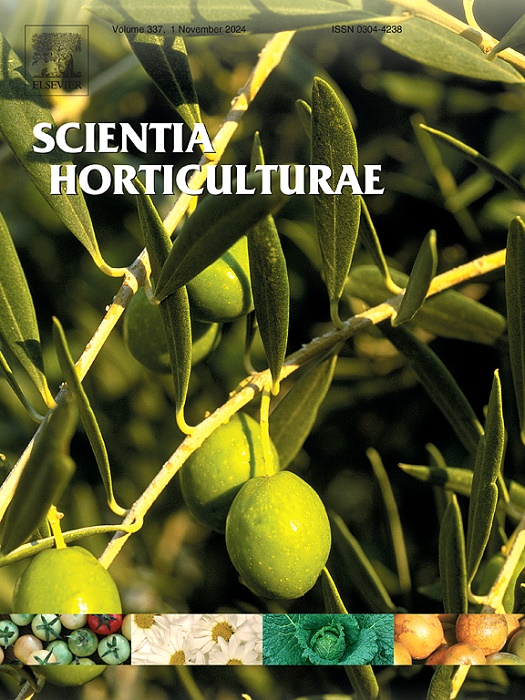Pomegranate Aux/IAA9A gene offers new insights into seed development and tissue lignification
IF 3.9
2区 农林科学
Q1 HORTICULTURE
引用次数: 0
Abstract
The auxin/indole-3-acetic acid (Aux/IAA) transcription repressor acts as a key switch in the auxin signaling pathway and plays important roles in various aspects of plant development and growth, including fruit and seed development. However, little is known about Aux/IAA genes in pomegranate. We carried out a genome-wide association study to identify candidate Aux/IAA genes involved in pomegranate seed coat development and performed a gene function study of the candidate gene PgIAA9A. Twenty-four PgIAA genes were identified in the pomegranate genome. Among them, PgIAA15, PgIAA16, PgIAA9A, PgIAA3B, PgIAA27B, and PgIAA11 exhibited high levels of expression in the seed coat, including the fleshy, edible outer seed coat and the sclerotic inner seed coat. Furthermore, the transcription of these six genes in the inner seed coat was up-regulated by exogenous IAA. Overexpression of PgIAA9Am encoding a stabilized PgIAA9A protein in Arabidopsis resulted in restricted plant growth and development, exemplified by reduced silique length and seed size and decreased lignin contents in stems, leaves, and seeds. Moreover, the expression of genes related to vascular development was reduced. These results shed light on the potential roles of PgIAA9A in pomegranate seed coat development, particularly in terms of seed size and hardness.
求助全文
约1分钟内获得全文
求助全文
来源期刊

Scientia Horticulturae
农林科学-园艺
CiteScore
8.60
自引率
4.70%
发文量
796
审稿时长
47 days
期刊介绍:
Scientia Horticulturae is an international journal publishing research related to horticultural crops. Articles in the journal deal with open or protected production of vegetables, fruits, edible fungi and ornamentals under temperate, subtropical and tropical conditions. Papers in related areas (biochemistry, micropropagation, soil science, plant breeding, plant physiology, phytopathology, etc.) are considered, if they contain information of direct significance to horticulture. Papers on the technical aspects of horticulture (engineering, crop processing, storage, transport etc.) are accepted for publication only if they relate directly to the living product. In the case of plantation crops, those yielding a product that may be used fresh (e.g. tropical vegetables, citrus, bananas, and other fruits) will be considered, while those papers describing the processing of the product (e.g. rubber, tobacco, and quinine) will not. The scope of the journal includes all horticultural crops but does not include speciality crops such as, medicinal crops or forestry crops, such as bamboo. Basic molecular studies without any direct application in horticulture will not be considered for this journal.
文献相关原料
公司名称
产品信息
索莱宝
lignin assay kit
 求助内容:
求助内容: 应助结果提醒方式:
应助结果提醒方式:


